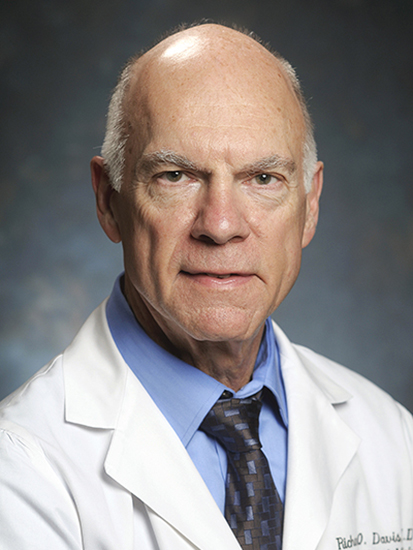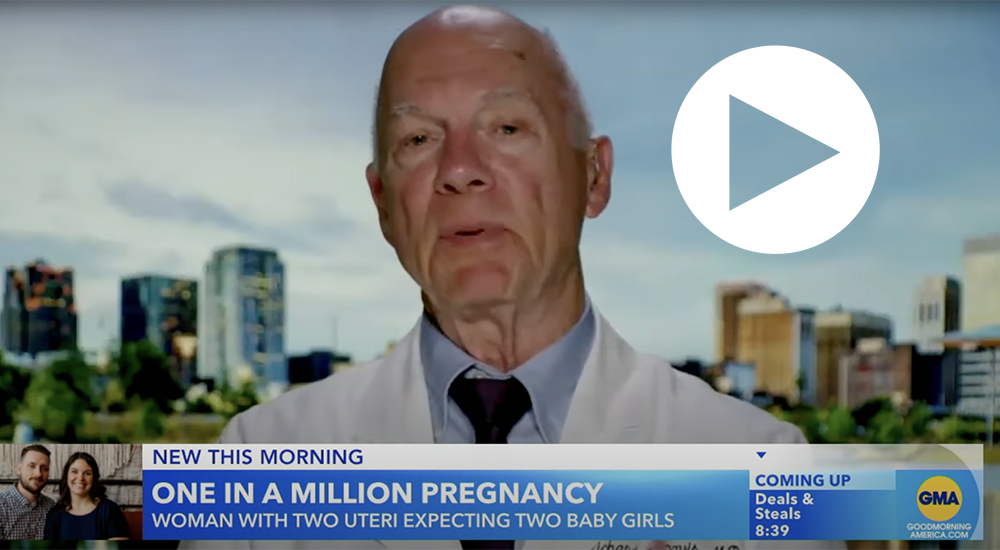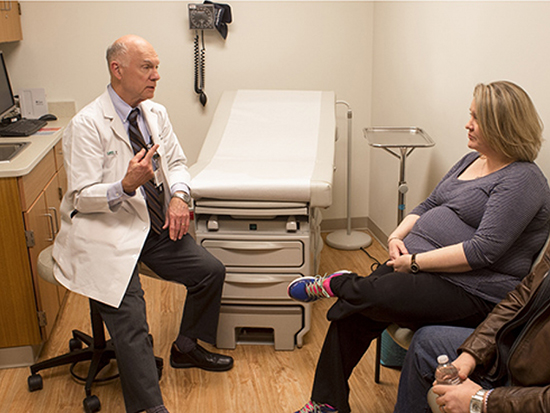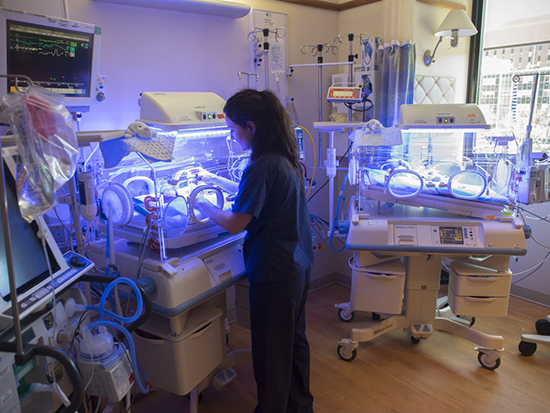
When you have been delivering babies for more than half a century like Richard O. Davis, M.D., professor in the Division of Maternal-Fetal Medicine of the Department of Obstetrics and Gynecology, there are not many things you have not seen before — especially at a hospital as busy as UAB.
“During residency applicant interviews, I always told students that they would probably see or hear about every obstetric complication that can happen if they came here,” Davis said. “We get a lot of transfers of patients related to pregnancy, preeclampsia, preterm labor, severe hyperemesis and other complex medical conditions, such as cardiomyopathy. For many of these patients, we are the only place that can take care of them and we have cutting-edge technology and expertise.”
Davis, who specialized in multiples over the years, helped care for the Harris sextuplets, the first surviving set of African-American sextuplets in the United States. They were born at UAB Hospital in July 2002 at only 26 weeks, “which I thought was just amazing,” Davis said. A few years later, he cared for identical quadruplets, an occurrence described at the time as 1 in 8 million. So last fall, when Shweta Patel, M.D., an assistant professor in the Department of Obstetrics and Gynecology, brought Davis the case of a patient with a rare double uterus (seen in 0.3 percent of women), that was something he had dealt with. But the patient, Kelsey Hatcher, was pregnant with a baby in each uterus. “Dr. Patel said, ‘I’ve never seen that before,’” Davis recalled. “I said, ‘Neither have I.’”
 Davis appears on "Good Morning America" — click to view video
Davis appears on "Good Morning America" — click to view videoThe story attracted national attention after the Hatcher twins were born on Dec. 19 (Roxi) and 20 (Rebel), 2023. Davis appeared on “Good Morning America” to talk about the case, and Davis and Patel were interviewed by reporters from NPR, the BBC, People Magazine and the Washington Post, among other outlets.
That was one more surprise in a career filled with them for Davis, who will be honored for his five decades of service to UAB during the annual Service Awards Program Reception on April 10 in the Hill Student Center.
Three others — Donna Andrews, program manager for the University Honors Program; James V. Jordan, Instrument and Control Tech in Building Automation & Controls; and Johnny W. Scott, M.D., Ph.D., professor in the Radiology Chair Office — will be honored for 45 years of service.
A list of others being honored for 20 or more years of service also is online.
First in his family to go to college
Davis came to UAB in July 1973 as an intern (what today would be called a first-year resident) in the Department of Obstetrics and Gynecology, fresh out of medical school. He had not planned on becoming a doctor when he was growing up in Winder, 23 miles outside Athens in northeast Georgia. He would be the first in his family to go to college at all. But his good friend, who was two years older, wanted to be a doctor, and Davis followed him about an hour south to Oxford College of Emory University, where, being good in science, he majored in chemistry and then went on to medical school himself.
At the Medical College of Georgia, “I did not think I would do obstetrics,” Davis said. “I saw one or two forceps deliveries and got to deliver a baby every now and then as a medical student, but I was really interested in endocrinology-fertility, as they called it in those days.” When he got to UAB, however, “the obstetrics service was very busy and I gravitated to that,” Davis said. “There were not many faculty, but they were very good.” Charles Flowers Jr., M.D., inaugural chair of the Department of Obstetrics and Gynecology, was here and would become Davis’ primary mentor. Other cornerstones of the department included Jack Huddleston, M.D., UAB’s first director of Maternal-Fetal Medicine, “who was doing mainly obstetrics” at the time, Davis said, Hugh Shingleton, M.D., the first gynecologic oncologist in the state of Alabama, and John Benjamin Younger, M.D., who established the first Division of Reproductive Biology and Endocrinology in the state.
There was no Women and Infants Center at the time. “Cooper Green Hospital opened in 1972 and prior to that time most of the patients were delivering at UAB Hospital in wards with curtains between them,” Davis said. “Cooper Green was state-of-the-art, with nice, big labor rooms.” Other deliveries took place in rooms on the fifth floor of Jefferson Tower. “There were probably 220 to 240 deliveries a month at Cooper Green and another 50 to 60 at UAB Hospital, and we would go back and forth at night when we were third-year residents,” Davis said. “There were no work-hours restrictions in those days and as interns we were on call every other night for two to three months.”
"It was amazing you could relieve that much pain"
It wasn’t just the volume of deliveries that attracted Davis to obstetrics, but the opportunity to help. “When I came here, ultrasound was just starting to come along,” Davis said. Ectopic pregnancies — when a fertilized egg grows outside the uterus, leading to potentially life-threatening bleeding — were only diagnosed “when they were about to rupture or had ruptured,” Davis said. “Back in those days, there was a big incision involved, but you would go to see the patient and she would say, ‘I feel a whole lot better than yesterday.’ It was amazing you could relieve that much pain.”
Davis initially planned to go into private practice after he finished his residency, but he liked being able to balance research with his clinical care, and he enjoyed the interesting and complex cases that come to UAB. “People come in scared and worried and you can tell them what is going on and put them at ease as much as you can,” he said. “I really enjoyed taking care of the more complicated patients. If I hadn’t really liked that, I would have burned out a long time ago.”
Over the course of his career, Davis has seen new technology and new treatments reshape pregnancy care. “We don’t see ruptured ectopic pregnancies as much anymore,” he said. “If ectopic pregnancies can be diagnosed early ,they can be treated medically with methotrexate and most times avoid surgery.”
 Davis initially planned to go into private practice after he finished his residency, but he liked the interesting and complex cases that come to UAB. “People come in scared and worried and you can tell them what is going on and put them at ease as much as you can,” he said.Ultrasound has made a tremendous impact on his profession, Davis said — lowering the odds of a surprise during pregnancy or delivery. “When I started, there was no such thing as maternal-fetal medicine,” Davis said. “We used to have to date pregancies by physical exam. Now we date pregnancies better, follow pregnancies better. We first used ultrasound for the more complicated patients, and then the standard of care was to try to do ultrasound in the first trimester and an anatomy scan.” The images started out so basic that “we might look at a scan and say, ‘Well, there’s the baby,’ and not much more,” Davis said. “Now we detect a lot of fetal anomalies that used to be surprises when we delivered the baby. Even 15 years ago a lot of the heart babies were not diagnosed prenatally. Now we can see the heart so well that it is pretty unusual for a baby to be born with that undiagnosed.” When a complication is spotted, “we can work with specialists to treat those issues,” Davis said. “At UAB, our teams and the specialists have always worked together, but with so many more specialists here now, we have more opportunities to collaborate in caring for moms and babies.”
Davis initially planned to go into private practice after he finished his residency, but he liked the interesting and complex cases that come to UAB. “People come in scared and worried and you can tell them what is going on and put them at ease as much as you can,” he said.Ultrasound has made a tremendous impact on his profession, Davis said — lowering the odds of a surprise during pregnancy or delivery. “When I started, there was no such thing as maternal-fetal medicine,” Davis said. “We used to have to date pregancies by physical exam. Now we date pregnancies better, follow pregnancies better. We first used ultrasound for the more complicated patients, and then the standard of care was to try to do ultrasound in the first trimester and an anatomy scan.” The images started out so basic that “we might look at a scan and say, ‘Well, there’s the baby,’ and not much more,” Davis said. “Now we detect a lot of fetal anomalies that used to be surprises when we delivered the baby. Even 15 years ago a lot of the heart babies were not diagnosed prenatally. Now we can see the heart so well that it is pretty unusual for a baby to be born with that undiagnosed.” When a complication is spotted, “we can work with specialists to treat those issues,” Davis said. “At UAB, our teams and the specialists have always worked together, but with so many more specialists here now, we have more opportunities to collaborate in caring for moms and babies.”
Today, UAB offers so-called 4K ultrasounds, with images so startlingly clear “they look like a photograph,” Davis said. “There is no telling what it will be like in 10 years.”
Biggest change: neonatal care
But perhaps the biggest change over his career has been in neonatal care, Davis said. “I really liked pediatrics when I was a medical student, but at the time many of those babies died. Working with premature babies was often a sad place to be. But now our survival rates are really good.” Corticosteroids can now mature a baby’s lungs and magnesium sulfate helps prevent brain injury.
 Babies being cared for in UAB's Regional Neonatal Intensive Care Unit. Davis says the unit has played a major role in improving outcomes for babies in Alabama over his career.One negative surprise was how difficult it has been to affect the premature delivery rate, Davis said. “It has not changed much in years. A lot of research, including here at UAB, went into that, and we were really convinced we could do something that would prevent preterm labor.” But tocolytic drugs, which had seemed promising, made only minor differences in delaying premature deliveries, Davis said, “and they made patients feel awful. That is something we still need to work on.”
Babies being cared for in UAB's Regional Neonatal Intensive Care Unit. Davis says the unit has played a major role in improving outcomes for babies in Alabama over his career.One negative surprise was how difficult it has been to affect the premature delivery rate, Davis said. “It has not changed much in years. A lot of research, including here at UAB, went into that, and we were really convinced we could do something that would prevent preterm labor.” But tocolytic drugs, which had seemed promising, made only minor differences in delaying premature deliveries, Davis said, “and they made patients feel awful. That is something we still need to work on.”
But the regionalization of care, with babies brought to specialized neonatal ICUs such as the one at UAB, staffed with neonatologists 24 hours a day, has contributed to greatly improved outcomes after premature babies are born. Bruce Harris, M.D., “traveled across the state talking to hospitals and physician groups about how important it was to have premature babies born in a place like UAB with a neonatal nursery because the babies survived better,” Davis said. (In 2021, Guinness World Records noted that the world’s most premature infant to survive is Curtis Means, born at UAB Hospital in 2020, who was 21 weeks and one day in gestation, and spent 275 days in UAB’s neonatal ICU.)
"UAB is a great place to work"
“UAB is a great place to work from the standpoint of the people we serve,” Davis said. “We have cutting-edge technology, but it is still important to listen to patients, take a good history and a good physical exam. Having a good foundation in the basics will help you go a long way.”
UAB has also been a great place to work for other reasons, Davis added. “There are great benefits, and the leadership is very invested in having happy employees,” he said. Plus, “I have worked with a lot of smart people. Working with residents keeps you on your toes and is fun. To see an intern go from having trouble tying knots to becoming a chief resident is rewarding.”
After 50 years delivering babies in Birmingham, Davis is now in the process of dealing with the paperwork of retirement. How did he decide this was the time? “If you have a job that you really enjoy and you are still productive and it doesn’t feel too much like work and you want to go to work, you should keep working,” he said. “There is no magic age, but there is a moment when Father Time will talk to you a bit. I finally got to that point.”
Something else Davis never saw coming: How UAB would grow. When Davis started at UAB, the actual people who now live on in the names of the campus buildings — including S. Richardson Hill, M.D., John Kirklin, M.D., and Tinsley Harrison, M.D. — still practiced on the grounds of a much smaller campus. “At the time, of course, I wasn’t thinking in terms of the tremendous growth that would take place here, or anyone on the faculty having a place in history,” Davis said. “I’m proud to have been here during the tremendous growth of UAB’s academic reputation, and equally satisfying has been the amazing expansion of all clinical services.” In 2022, UAB’s Department of Obstetrics and Gynecology was ranked fifth in the nation in the U.S. News and World Report Best Hospitals rankings.
As Davis prepares for a new chapter, he has experienced a few full-circle moments. “One of my co-residents was Ed Partridge,” who would go on to become director of UAB’s O’Neal Comprehensive Cancer Center, Davis said. “When I had my retirement reception last week, it took place in the Barbara and Ed Partridge Auditorium at the Cancer Center.”